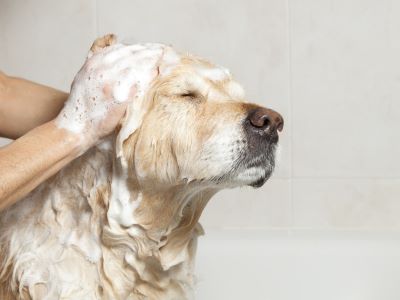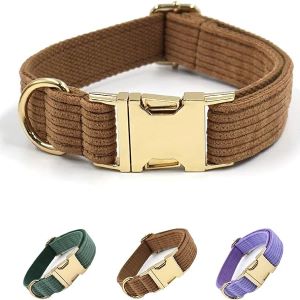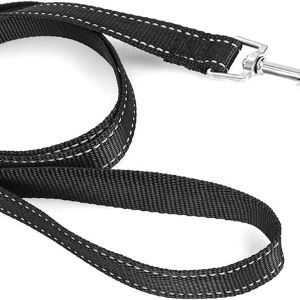As responsible pet owners, it is important to ensure that our furry friends are well taken care of and comfortable. One aspect of pet care that is often overlooked is their collars. While collars are essential for identification and control, they can sometimes cause discomfort and even allergies in dogs. Can dogs be allergic to their collar? Continue reading to find out!
Can Dogs Be Allergic to Their Collar?

So, can dogs be allergic to their collar? Yes, dogs can be allergic to their collars. Collar allergies are caused by Contact dermatitis, which is an allergic reaction to a substance that comes into contact with the skin. The skin around the neck is particularly sensitive, and any irritation or allergic reaction can cause discomfort and even infection.
The most common cause of collar allergies in dogs is the material of the collar. Collars made from synthetic materials, such as nylon and polyester, are more likely to cause allergies than those made from natural materials like leather or cotton. The chemicals used in the manufacturing process of synthetic collars can cause allergic reactions in dogs.
You Might Also Like:
Symptoms of Collar Allergies in Dogs
The symptoms of collar allergies in dogs can vary, but the most common signs are:
- Redness and irritation around the neck
- Scratching or rubbing the neck area excessively
- Hair loss around the neck
- Scabbing or sores on the neck
- A foul odour from the neck area
If your dog displays any of these symptoms, it is important to remove the collar immediately and consult a veterinarian for treatment.
Prevention and Treatment of Collar Allergies in Dogs

The best way to prevent collar allergies in dogs is to choose a collar made from natural materials like leather or cotton. These materials are less likely to cause an allergic reaction than synthetic materials. Additionally, choosing a collar that fits properly can also prevent irritation and discomfort around the neck.
If your dog has already developed a collar allergy, the first step is to remove the collar and clean the affected area with a gentle, hypoallergenic shampoo. It is important to avoid any harsh chemicals or perfumes that may further irritate the skin. You may also want to apply a topical cream or ointment recommended by your veterinarian to reduce inflammation and soothe the affected area.
In some cases, oral medication may be necessary to treat more severe allergic reactions. Your veterinarian may prescribe antihistamines, steroids, or antibiotics to manage the symptoms and prevent infection.
FAQs
Are cotton dog collars good?
The most affordable and practical dog collars are made of cotton web. Yet, they are among the least robust dog collars and leashes available and will quickly wear out. Thus, make your decision wisely.
How do you wash a cotton dog collar?
Use dog soap or shampoo for washing the cotton collar. First, put your dog collar in the bowl and if it’s really dirty you may want to give it a bit of rub to get any ground dirt out. Then leave the dog collar in the bowl for 15-20 minutes and then rinse clean. Then leave to dry after squeezing out any excess water.
Should my dog always wear its collar?
Although it could be tempting to remove your pet’s collar when they are inside your home, it is crucial that they always have a collar on. Accidents can occur at any time, so it’s best to be ready for them. A collar and ID tag are safety devices to protect your pet, much like a smoke alarm is a safety device to protect you and your family. Just like you wouldn’t remove the batteries from your smoke alarm, you shouldn’t take the collar off your pet.
How do you get rid of an itchy collar?
Spin the item inside out and soak it for 15 minutes in cold water with a couple of tablespoons of white vinegar, taking care to completely wet all the fibres.
Conclusion
Dogs frequently experience collar allergies, but with the right care and attention, they can be avoided and managed. Itching and allergic responses can be avoided by selecting a collar made of natural materials and making sure it fits properly. Remove the collar and seek veterinary care if your dog exhibits any signs of a collar allergy to stop future suffering and illness. You can maintain your beloved friend’s comfort and happiness while yet assuring their safety and identity with the right care.
References:
- Dermatology Fact Sheets. (2018, June 22). School of Veterinary Medicine. Retrieved February 28, 2024, from https://www.vetmed.ucdavis.edu/hospital/animal-health-topics/dermatology-fact-sheets
- Science X. (2020, March 12). “Cone of shame” makes pets miserable. Retrieved February 28, 2024, from https://phys.org/news/2020-03-cone-shame-pets-miserable.html
- PetMD Editorial. (2022a, August 30). 5 Ways Collars Can Harm Your Dog. PetMD. Retrieved February 28, 2024, from https://www.petmd.com/dog/care/5-ways-collars-can-harm-your-dog
- My dog is allergic to his flea and tick collar. (n.d.). Saga. Retrieved February 28, 2024, from https://www.saga.co.uk/magazine/home-garden/pets/dogs/vet-questions/dog-allergic-to-flea-tick-collar
- Dog Skin Problems – Common Skin Conditions in Dogs | Purina. (n.d.). Retrieved February 28, 2024, from https://www.purina.co.uk/articles/dogs/health/skin-fur-ears/skin-problems-and-your-dog






